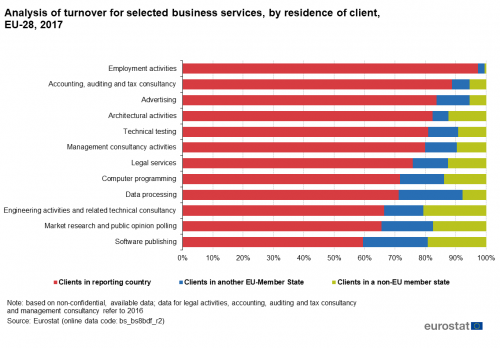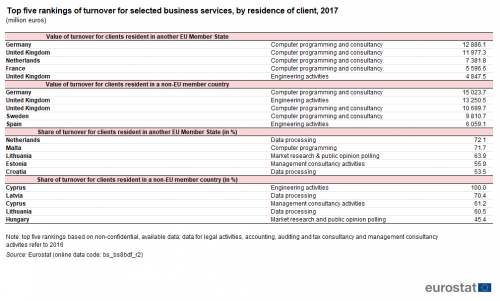Archive:Trade in business services
Data extracted in December 2019
Planned article update: January 2021
Highlights
In 2017, more than two fifths of EU sales by the software publishing sector were generated from clients residing in other countries.
In 2017, the EU computer programming and consultancy services sector recorded the highest levels of sales generated from clients residing in other EU countries.

(% of turnover)
Source: Eurostat (bs_bs8bdf_r2)
Globalisation patterns in EU trade and investment is an online Eurostat publication presenting a summary of recent European Union (EU) statistics on economic aspects of globalisation, focusing on patterns of EU trade and investment.
The business services sector can be viewed as providing key inputs in the production of other goods and services. As such, it makes an important contribution to EU-28 economy, promoting competitiveness and growth. The business services sector has expanded in recent years: this growth has been underpinned by the development of new services and more specialised tasks (including the management of supply chains and international production networks), but also reflects increased levels of outsourcing to external suppliers. These changes have provided a stimulus for the business services sector to become increasingly global in nature. Furthermore, technological changes have allowed smaller businesses to enter niche markets where previously they may have lacked the scale to trade internationally.
This article provides an analysis of the turnover (sales) of EU-28 enterprises in the business services sector, according to the residence of their clients — information is presented for clients residing in the reporting country, for clients residing in another EU Member State, and for clients residing in a non-EU member State, in other words, outside the EU. The analysis is based on non-confidential, available data.
Full article
Analysis of turnover for selected business services
In 2017, more than two fifths of EU-28 sales by the software publishing sector were generated from clients residing abroad
Figure 1 shows the proportion of business services turnover in 2017 that was accounted for by these three different sets of clients. For each of the business services shown, a majority of the EU-28’s turnover was realised by sales to clients from the reporting country (in other words, from clients residing in the domestic economy). This pattern was particularly evident for employment services and some specific professional services, whereas clients resident in other countries accounted for a higher share of total sales for activities such as software publishing services. Such disparities may be linked to the tradability of various services, the different modes for trading services, or barriers to entry which prevent/restrict trade in some business services.
In 2017, 97.29 % of the sales made by EU-28 employment activities were to clients from the reporting country; by contrast, the percentage of total turnover accounted for by domestic clients fell to 59.51 % for software publishing activities. Among the activities recorded, the share of turnover that was attributed from other EU member states was generally higher than that from clients residing in non-member states. For example, more than one fifth of the total turnover generated in software publishing (21.32 %) and in data processing (21.02 %) was accounted for by clients residing in other EU Member States. The highest shares of turnover being realised among clients residing outside the EU-28 were recorded for engineering activities and related consultancy (20.71 %) and software publishing (19.18 %).

(% of turnover)
Source: Eurostat (bs_bs8bdf_r2)
Ranking of the turnover generated by selected business services
In 2017,the EU computer programming and consultancy services sector recorded the highest levels of sales generated from clients residing in other EU countries.
Looking in more detail at developments across the individual EU Member States, Table 1 shows a ranking of the turnover generated by selected business services, according to the residence of clients. In 2017, German computer programming and consultancy enterprises recorded the highest value of business services sales to clients residing in another EU Member State (EUR 12.8 billion). The same activity — computer programming and consultancy — also accounted for the second, third and fourth highest value of sales, as made by British, Dutch and French enterprises.
Concerning sales to clients residing outside the EU, the highest level of turnover was generated once again by German computer programming and consultancy services (EUR 15 billion), while British and Swedish computer programming and consultancy enterprises recorded the third and fourth highest level of sales to non-EU countries, respectively. Aside from these, the other top rankings included engineering activities from British and Spanish enterprises whose turnover was ranked second and fifth, respectively. Regarding the value of turnover, those two sectors (computer programming and engineering) are can be considered dominant in 2017.
While the rankings of overall turnover are unsurprisingly dominated by some of the largest EU Member States, the second half of the table, presenting the percentage of the national sector's turnover that was generated by clients from abroad, is not. In 2017, almost three quarters (72.1 %) of all sales made in the Netherlands by the data processing enterprises were derived from clients residing in other EU Member States; an almost similar share was recorded for the computer programming enterprises of Malta.
The share of total turnover that was generated from clients residing in non-EU countries peaked at 100 % for Cypriot engineering enterprises; the only time a majority of sales was generated from clients residing outside the EU-28. The next highest shares were recorded for data processing services in Latvia (70.4 %) and management consultancy activities in Cyprus (61.2 %). The next highest shares were recorded for data processing in Lithuania (60.5 % of their turnover was generated from clients resident in a non- EU country) and market research and public opinion polling services in Hungary (45.5 %).

Source: Eurostat (bs_bs8bdf_r2)
Source data for tables and graphs
Direct access to
- Business services statistics (ESMS metadata file — bs_esms)